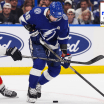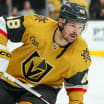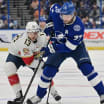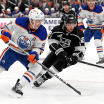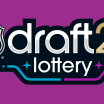One of the most telling moments of Brock Boeser's first quarter of the season came in the final minute against the Pittsburgh Penguins on Nov. 4.
The Vancouver Canucks' rookie forward already had his first NHL hat trick, was coming down the left side and could have shot at an empty net, aiming for his fourth goal of the game. Instead he opted to pass to defenseman Chris Tanev.
Canucks hope Boeser's fast start sign of bigger things to come
Forward leading NHL rookies in scoring after back-to-back two-goal games
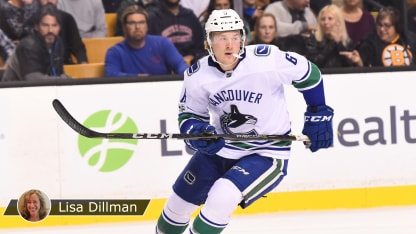
By
Lisa Dillman @reallisa / NHL.com Staff Writer
The Chris-first, not me-first moment, was one of those acts with a lingering impact. Tanev didn't score, but that wasn't the point.
"I could have shot," Boeser said a few days later. "I could have passed. But our [defense] had a ton of chances that game, so I saw that he had a better chance of scoring from there. That's what went through my head."
Boeser had his first NHL hat trick and an assist in the Canucks' 4-2 win against the Penguins, and he hasn't slowed down. The 20-year-old scored twice Tuesday in a 5-2 win at the Philadelphia Flyers and had two goals Wednesday in a 5-2 victory at Pittsburgh to take the NHL rookie scoring lead. He has seven points (six goals, one assist) in his past five games.
Scoring goals attracts notice, but humility builds currency in the dressing room.
"There's something about being humble," Canucks coach Travis Green said. "There's just something about making sure that you don't get ahead of yourself. Not only do people recognize that, but more importantly, your teammates recognize that."
Boeser leads NHL rookies in scoring with 21 points (11 goals, 10 assists) in 19 games; he's one point ahead of forwards Clayton Keller of the Arizona Coyotes and Mathew Barzal of the New York Islanders. Boeser and Keller are the only rookies leading their teams in scoring.
Boeser's breakout talent and quick release have been on full display in Vancouver but were developed and nurtured in his hometown of Burnsville, Minnesota, against a backdrop of personal challenges.
When Boeser was in high school, one of his closest friends died and another was permanently disabled in an automobile accident in 2014. His father, Duke, was diagnosed with Parkinson's disease in 2010, suffered serious injuries in a car accident in 2012 and had treatment and surgery for lung cancer earlier this year.
Boeser's most recent accomplishments couldn't have come at a better time for the family. Laurie Boeser, his mother, said her husband will have another scan in December to reconfirm that the cancer is gone.
"This is very good medicine," she said in a telephone interview from Minnesota. "Not only for my husband, but for all of us. We love this. This is amazing. It gives us something to look forward to, and he and Brock FaceTime on the phone. I'm more the go-to person for the to-dos. I'm still mom."
Boeser played the final nine games of the 2016-17 season with Vancouver, joining the Canucks the day after his season at the University of North Dakota ended. As luck would have it, he made his NHL debut against the Minnesota Wild in St. Paul.
The Canucks asked Boeser's parents to read their starting lineup in the dressing room.
"It was a special moment when they got to come in there," Boeser said. "I kind of got emotional. I can't thank them for enough for what they did. My eyes started getting watery and stuff. I had to refocus."
Laurie called it a "once-in-a-lifetime experience.
"He was very reluctant but they convinced him," she said of her husband. "And I said, 'I'll be right next to you.' The next thing we're in there and I thought 'If I look at Brock, I'm just going to fall apart.' My husband was so focused on what he had to read.
"When I finally looked over at Brock -- the red cheeks and the big tears in his eyes. It was amazing. What a rare opportunity. You get to play your first home game in your hometown, and he scored right in front of our suite."
Five points (four goals, one assist) in nine games gave Canucks fans a glimpse of Boeser's talent. But an offseason coaching change -- Green replaced Willie Desjardins -- meant he faced different challenges this season.
Green said Boeser looked tired by the end of training camp. He was a healthy scratch in the first two games of the season and also missed an Oct. 30 game against the Dallas Stars because of a foot contusion.
"We had a hard training camp," the first-year coach said. "We had an open dialogue with him. He was a little tired, and that happens with the pace as training camp goes on.
"Give Brock credit. He pushed himself, got his legs back under him and has played well ever since then."
Brad Berry, Boeser's coach at North Dakota, has approved of the way the Canucks handled his former player. Boeser played two seasons at North Dakota, winning the NCAA championship in 2015-16, his freshman season.
"They did it the right way," Berry said. "They didn't rush him into games or situations. They made him earn it. That's what we do here at North Dakota. That was a great step by Vancouver."
Boeser had points in his first four games this season and quickly developed chemistry with linemates Bo Horvat and Sven Baertschi.
"To me, it's kind of a new-age line," TSN analyst Ray Ferraro said. "Five or seven years ago, you might have needed a big power forward on that line. I don't see that anymore.
"That's a trio that can and should work well. Horvat is strong and he can skate. Baertschi moves the puck well. Then you have your trigger guy and that's Boeser."
Green feels Boeser has plenty of upside.
"He's got a good head on his shoulders," he said. "It's not like we're seeing the best Brock Boeser that we're going to see.
"I don't know any player that's come into the League and played 10 games and he's at his best, from the best players in the world. That just doesn't happen. You look at Sidney Crosby, Connor McDavid … they didn't just come in the league and be the best players.
"Sometimes it takes one, two, three, five, 10 years before a player reaches what he is."


